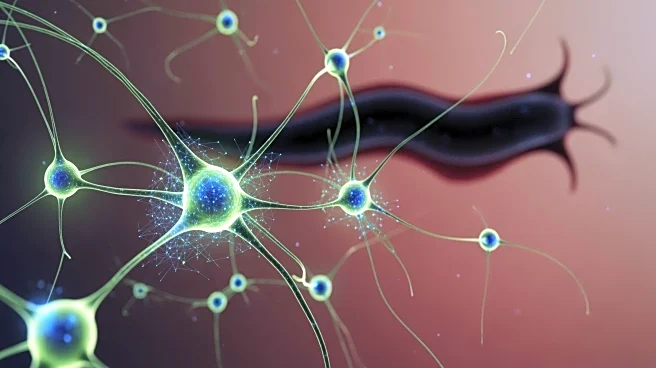What's Happening?
Researchers at the Stowers Institute for Medical Research have discovered that stem cells in the freshwater planarian Schmidtea mediterranea respond to signals from distant cells rather than their immediate
neighbors. This finding challenges the traditional concept of stem cell niches, where surrounding cells dictate stem cell behavior. The study, led by Frederick 'Biff' Mann, PhD, and Alejandro Sánchez Alvarado, PhD, suggests that planarian stem cells have a unique ability to regenerate by acting independently from their surroundings. The research, published in Cell Reports, highlights the potential for understanding stem cell regulation and developing regenerative therapies for humans.
Why It's Important?
The discovery of planarian stem cells' unique behavior could significantly impact regenerative medicine. By understanding how these stem cells operate independently, scientists may develop new methods to control stem cell functions in humans, potentially leading to advanced treatments for tissue repair and regeneration. This research could pave the way for breakthroughs in treating conditions where tissue damage is prevalent, offering hope for improved healing processes and reducing the risk of cancer associated with unchecked cell growth.
What's Next?
Future research will focus on the molecular mechanisms that allow planarian stem cells to operate independently from traditional niches. Scientists aim to uncover how distant cells, such as intestinal cells, provide critical instructions for stem cell function during regeneration. This knowledge could lead to innovative approaches in stem cell therapy, enhancing the body's natural healing capabilities and offering new solutions for regenerative medicine.
Beyond the Headlines
The study raises questions about the ethical implications of manipulating stem cell behavior for therapeutic purposes. Understanding the balance between stem cell independence and regulation is crucial to prevent potential risks, such as tumor formation. Additionally, the research highlights the importance of exploring non-traditional models like planarians to gain insights into stem cell biology, which could revolutionize regenerative medicine.










